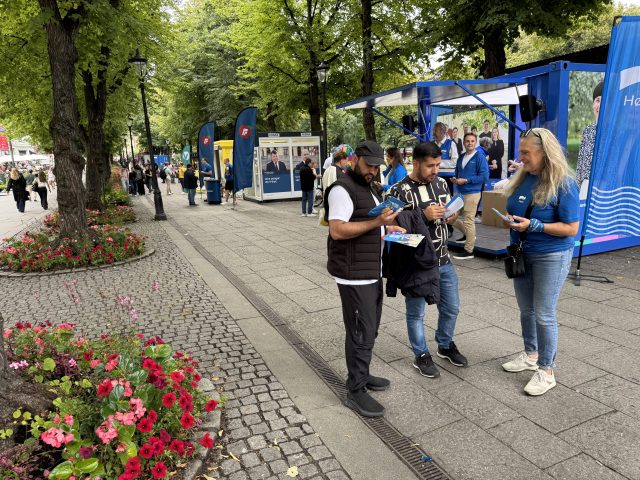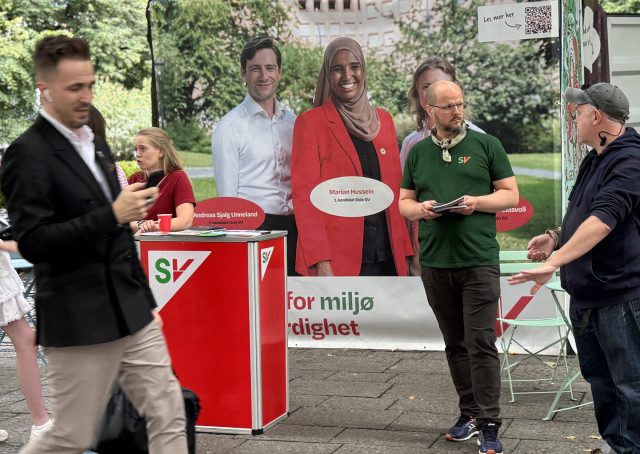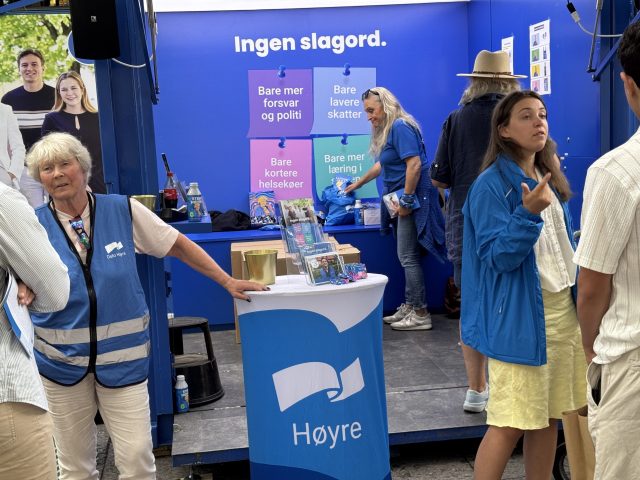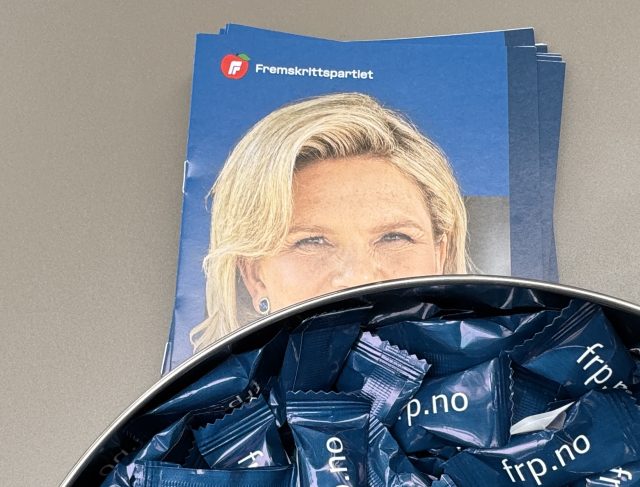An estimated 72 percent of Norwegians have already decided who they want to run the country, and record numbers of them have taken advantage of early voting. That hasn’t stopped election campaign workers from trying to win more votes, even though nearly 500,000 eligible voters have cast their ballots two weeks ahead of Election Day.
 Political parties’ campaign booths once again line Oslo’s main boulevard, Karl Johans Gate, making for lots of impromptu political discussions and debate at the grass-roots level. PHOTO: NewsinEnglish.no/Morten Møst
Political parties’ campaign booths once again line Oslo’s main boulevard, Karl Johans Gate, making for lots of impromptu political discussions and debate at the grass-roots level. PHOTO: NewsinEnglish.no/Morten Møst
The race remains wide open and politicians are out on the campaign trail, while party faithful staff booths in cities and towns all over the country. That’s where voters can stop and debate issues, pick up brochures and get their own overview of the political parties’ positions on various issues.
Commentators have claimed that there haven’t been as many burning issues during this campaign, since domestic policies have long been overshadowed by international conflicts, defense and preparedness. Recent party leader debates have boosted issues on the homefront, though, long dominated by taxation, health care and household economy.
The biggest debates have been over Norway’s still-controversial fortune tax on individuals’ and companies’ net worth, and whether Norway should reimpose inheritance tax. The latter currently seems unlikely, since it was abolished by the last Conservatives-led government and both the Labour Party and its former government partner, the Center Party, have recently ruled it out.
 The Socialist Left party (SV) is trying hard to have influence over, or even join, a new government led by the Labour Party. It has slipped in recent polls and currently appeals to around 6.5 percent of voters, about the same as the more leftist Rødt Party. PHOTO: NewsinEnglish.no/Morten Møst
The Socialist Left party (SV) is trying hard to have influence over, or even join, a new government led by the Labour Party. It has slipped in recent polls and currently appeals to around 6.5 percent of voters, about the same as the more leftist Rødt Party. PHOTO: NewsinEnglish.no/Morten Møst
A recent public opinion poll, meanwhile, indicates that defense is suddenly no longer viewed as the most important issue in Norway’s upcoming election. That could be because there’s been widespread agreement among all parties and voters to dramatically increase defense spending and preparedness, and extend high levels of aid to Ukraine.
The new poll conducted by research firm Respons Analyse for newspaper Aftenposten showed that defense had fallen from the top spot on a list of what voters think is most important, to just sixth-place. Taking over as the most important issue was “social differences within Norwegian society,” followed by the economy and workplace issues, health care, taxes and fees, and climate and the environment.
Climate issues, long seen as having faded since Russia’s war on Ukraine began, were clearly back on the agenda this week. Scores of demonstrators including Swedish climate activist Greta Thunberg and Norwegian musician Aurora blocked the entrance to Norway’s large oil refinery at Mongstad, for example, and later turned up outside Parliament in Oslo. They also blocked entrances at Norway’s central bank, occupied its lobby and demonstrated outside Norway’s largest commercial bank, DNB, protesting their investments and financing tied to both oil and Israeli companies.
 Norway’s Conservative Party has fallen dramatically in public opinion polls and opted against having any campaign slogan this year in the form of “Ingen slagord” (No slogan), but it still claims at its booth here in Oslo that it “just wants more defense forces and police, lower taxes, shorter waiting lists for health care and more learning in Norwegian schools.” PHOTO: NewsinEnglish.no/Morten Møst
Norway’s Conservative Party has fallen dramatically in public opinion polls and opted against having any campaign slogan this year in the form of “Ingen slagord” (No slogan), but it still claims at its booth here in Oslo that it “just wants more defense forces and police, lower taxes, shorter waiting lists for health care and more learning in Norwegian schools.” PHOTO: NewsinEnglish.no/Morten Møst
Last spring, fully 30 percent of those questioned ranked defense and security as the most important issue of the day. Now that’s fallen to 17 percent, putting it into sixth place but still ahead of schools and education issues (14 percent), immigration and integration (12 percent) and elder care (11 percent). Energy issues are now viewed as most important by just 8 percent of Norwegians, probably because electricity rates have fallen dramatically, while only 5 percent think transport issues are most important.
The abrupt change in issues of top concern comes just as there’s been another change in the standings of Norway’s political parties. The remarkable resurgence of the Labour Party earlier this year has stalled just as the election campaign was officially getting underway earlier this month. In early August, Labour held 28 percent of the vote, nearly twice the Conservatives’ 15.2 percent. The more conservative Progress Party has been running well ahead of the Conservatives for months, even though its often-controversial leader Sylvi Listhaug doesn’t seem interested in becoming Norway’s next prime minister.
 Sylvi Listhaug’s right-wing Progress Party (Frp) has become Norway’s second-largest party in recent months, but Listhaug herself hasn’t campaigned as a prime minister candidate. She’s keen to form a non-socialist government with the Conservatives, but it would most likely be led by its former prime minister Erna Solberg. PHOTO: NewsinEnglish.no/Morten Møst
Sylvi Listhaug’s right-wing Progress Party (Frp) has become Norway’s second-largest party in recent months, but Listhaug herself hasn’t campaigned as a prime minister candidate. She’s keen to form a non-socialist government with the Conservatives, but it would most likely be led by its former prime minister Erna Solberg. PHOTO: NewsinEnglish.no/Morten Møst
Last week, though, came a new poll showing a new majority among all the parties on the conservative side of Norwegian parties for the first time since January. Labour remained the largest single party, but tumbled from 28- to 24.8 percent. Progress also dipped, to 21.5 percent, while the Conservatives climbed to 17.9 percent.
That’s what’s likely to make the standings of all the small Norwegian parties especially important in the upcoming election. There’s lots of talk suddenly about voting “tactically,” that is, not for a party you suddenly support but rather because your vote could make the difference of whether the election results in a socialist- or conservative majority in Parliament.
Erna Solberg’s Conservatives, meanwhile, remain far behind expectations, with commentators claiming the party simply has no winning issues. Incumbent Prime Minister Jonas Gahr Støre remains the favoured candidate to address all the international unrest and, with former NATO chief Jens Stoltenberg as incumbent finance minister, US President Donald Trump. Just two weeks ahead of the election, though, strategists told Aftenposten that “none of Labour strategists can sleep well at night.” The election, claim commentators, is shaping up as a political thriller.
NewsinEnglish.no/Nina Berglund